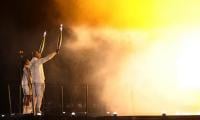Making the most of the presence of a large number of classical musicians in Karachi due to the All Pakistan Music Conference Karachi that began on Saturday, the Tehzeeb Foundation on Friday night hosted the performance of a sitar virtuoso and an equally talented classical vocalist as a precursor to the music festival.
Sitar player Ustad Ashraf Sharif Khan of the Poonch Gharana and Ustad Shafqat Salamat Ali Khan of the Shaam Chaurasi Gharana moved the audience by their mastery.
Both the sitar player and vocalist are sons of giants. The former’s father Ustad Muhammad Sharif Khan Poonchwala was considered among the greatest sitar players of Pakistan, while the latter’s father Ustad Salamat Ali Khan enjoys a legendary status among the classical vocalists of his generation.
It is not easy to carry on with the legacy of such masters, but both Ashraf and Shafqat, as it was evident from their performances, have rightfully earned the status of Ustad.
The sitar player, who mostly lives in Europe, was accompanied by Ustad Shahbaz Hussain, who came from the United Kingdom, on the tabla. The rapport between the two indicated how much comfort they both had while performing together.
Ashraf announced that earlier he planned to render Raag Madhuvanti, but at that moment he felt like playing Raag Kirvani that has become a popular melody in the Indian classical music, which adopted it from the Carnatic music.
The maestro started with Alap, Jor and Jhala, which are solo modes played without the percussion instrument in which Lay (tempo) gradually increases from Alap to Jhala. It was followed by rendition of the raag in a Vilambit (slow) tempo, followed by Drut (fast) tempo with the tabla player playing the required cycle of beats, called taal.
The raag generated an aura of somberness and pathos when the maestro started the Alap. However, as the tempo increased, it also imparted shades of glee and energy. The performance captivated the audience from the beginning till the end. Even during the slow rendition in Alap, the musician played some sequences so well that listeners spontaneously responded with Waah and claps.
The finale of the performance when both the artistes on the sitar and table were in full speed awestruck the audience.
Speaking at the end of the performance, the sitar player suggested to the organisers to fix the temperature of the venue at least some 15 minutes prior to the start of the concert and then not change it. He said the change of temperature during performance disturbs the musicians and even alter the sound of their instruments.
Kirvani was followed by Khayal in Raag Aiman rendered by Shafqat who was accompanied on the tabla by Kashif Ali Dani and Gul Muhammad on the Sarangi.
The Ustad did not disappoint. Raag Aiman is one of the most popular raags of the Indian classical music that embodies tranquility. It is also considered a major raag due to immense scope of improvisation as its aesthetic content is not lost in any octave.
Even though the vocalist had time constraints, he presented an elaborate Khayal by having the Alap followed by three bandishes in Vilambit, Madh (medium) and Drut tempos, which were then followed by a Tarana, which is the rendition of a raag usually in a fast tempo with meaningless syllables such as Tana, Dhoom, Yali, Dheem, etc.
The lyrics of all the bandish that were set in various tempos and taals were devotional. Even in the slower tempos, the Ustad performed taans and other embellishments. The moments where he went to the upper octave and stayed at extremely high pitches for a while garnered applause from the audience.
The Khayal was followed by a Thumri in Raag Pahadi.
An introductory talk at the start of the event was given by musicologist Sharif Awan. He told the audience not to wait till the end for applause. He explained that in the concerts of the Western classical music, the audience was expected to remain quiet till the end, but in our classical music, that was not something appropriate.
He asked the audience to vocally appreciate the performers whenever they felt like doing so.
An aerial view of Karachi city. — AFP/FileSoliloquyArtChowk the Gallery is hosting an art exhibition featuring works...
Sindh Chief Minister Syed Murad Ali Shah speaks at an event in a local hotel on July 7, 20254. — Facebook/Sindh...
Activists of Tehreek-e-Insaf hold a protest for the release of PTI Founder Imran Khan, at the Karachi Press Club on...
Karachi Metropolitan Corporation City Council opposition leader, Saifuddin Advocate speaks to local government...
A representational image showing a gas flame. — AFP/FileThe SSGC is commissioning yet another gas distribution...
This representational image shows a person holding a gavel. — Pexels/FileA sessions court has sentenced a man to...







